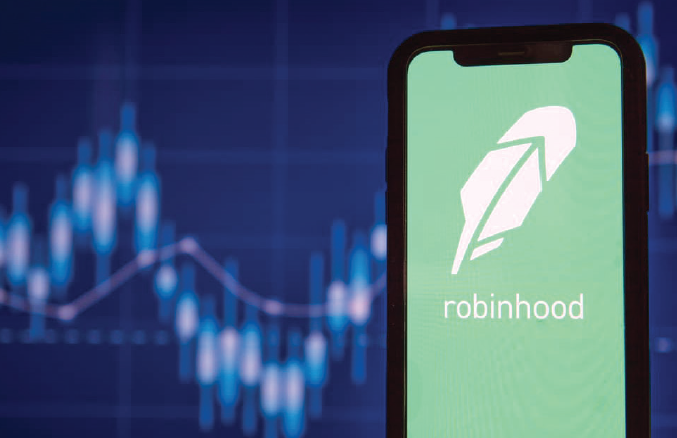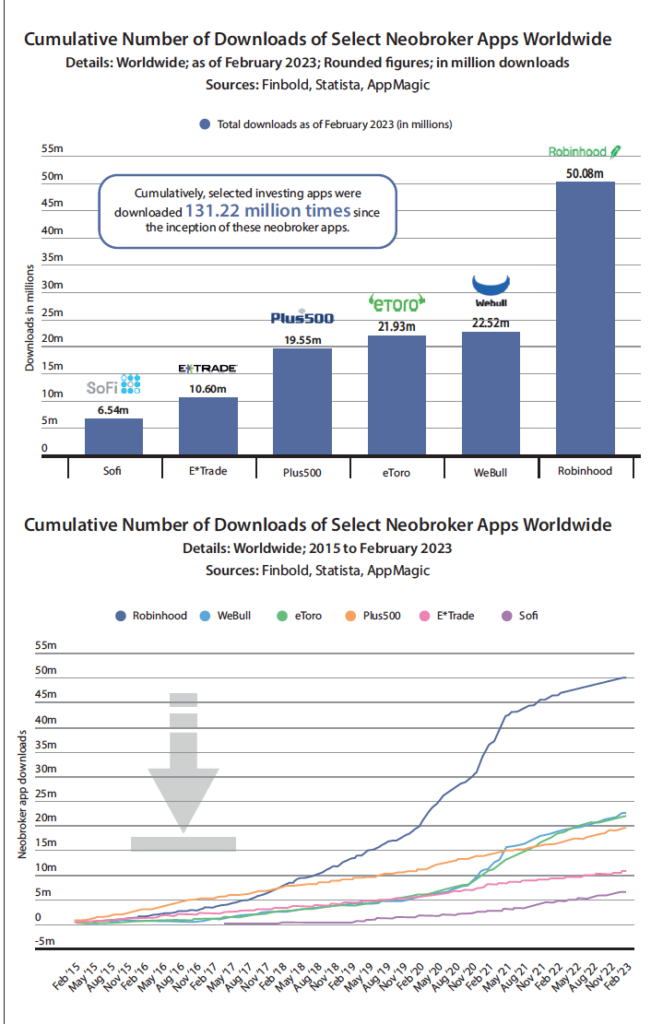Mar 28, 2023 Justinas Baltrusaitis

The rise of investment apps has been one of the biggest trends in the financial industry in recent years, with millions of people turning to mobile platforms to manage their money. While traditional brokerage firms have long dominated the investing landscape, neobroker apps are emerging as a popular alternative in return, hitting new milestones.
In particular, data acquired by Finbold on March 28 indicates that six leading investment applications have recorded a cumulative 131.22 million downloads globally since their inception, with the downloads covering the period between 2015 and February 2023.
A review of the apps indicates that Robinhood is the most downloaded platform at 50.08 million or 38% of the downloads recorded by the top neoboker apps. Webull ranks second with almost half of Robinhood’s downloads at 22.52 million, while eToro ranks third with 21.93 million downloads. Plus 500 is fourth with 19.55 million downloads. E*TRADE has the fifth-highest number of downloads at 10.60 million, while SoFi lies sixth at 6.54 million.
The implication of 100 million downloads milestone
The achievement of hitting over 100 million downloads is a testament to the growing popularity of neobroker apps and the increasing number of people turning to these platforms to manage their investment portfolios. Apps have become an increasingly important segment of the investing landscape.
The apps’ growth has been fuelled by factors such as convenience and accessibility, reducing the high trading fees and minimum account balances associated with traditional brokerage firms alongside educational resources and tools, which is particularly appealing to new investors. It is worth noting that the growth has contributed to the emergence of a new era of retail investors who are fundamentally distinct from their institutional counterparts.
Moreover, the download figures demonstrate the impact of the platform’s product offerings. The apps have increasingly capitalized on the increasing popularity of products such as cryptocurrencies to tap into a new class of users. As more investors view the crypto sector as an exciting opportunity for potential gains in a short timeframe, neobroker apps are well-positioned due to their market standing and regulatory compliance, providing assurances of funds’ safety.
Notably, the number of downloads is likely to grow, considering that the crypto sector is recording gains when the traditional markets are on a downtrend from rising inflation and continued interest hikes.
Pandemic fuelled growth
A review of the downloads trajectory shows a spike amid the pandemic. The pandemic increased market volatility, presenting risks and opportunities for investors. In this line, investment apps offered a convenient way for people to start investing without the need to visit a physical brokerage office or have a large amount of money to invest.
The health crisis also led to a shift towards digital and mobile solutions, and investment apps were aligned to meet this demand, offering user-friendly mobile apps and digital platforms. The crisis further fueled the popularity as people sought to take advantage of market fluctuations and new opportunities amid an influx of stimulus packages.
Robinhood’s dominance
Robinhood stands out among the applications, with the platform operating based on seeking to democratize investment for most traders, with the app’s success largely tied to the company’s commission-free trading.
This policy has made it possible for users to buy and sell stocks, exchange-traded funds (ETFs) options, and cryptocurrencies without paying any fees or commissions. As a result, investing has become more accessible to people with high trading fees, and minimum account balances at traditional brokerage firms may have deterred them.
Additionally, Robinhood is considered to have an intuitive user interface and a focus on appealing to younger investors, attributes that resonate with users and have led to the platform being seen as a disruptor in the traditional brokerage industry.
However, Robinhood’s success has not come without controversy. In early 2021, the company faced significant backlash after temporarily suspending trading certain stocks, including GameStop (NYSE: GME) and AMC (NYSE: AMC), during the height of the meme stock frenzy. The move sparked widespread user outrage, and the company faced multiple lawsuits and regulatory scrutiny. At the same time, the company has had run-ins with regulators over anti-money laundering laws violations.
Although the investment environment is clouded in uncertainty, the future of investment apps looks promising as they seek to offer access to new markets. The apps will also likely embrace new technologies like incorporating artificial intelligence and machine learning to provide personalized recommendations for users.







